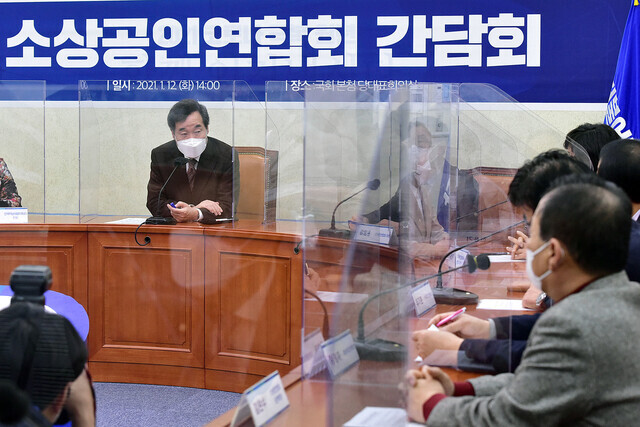[Editorial] Politicians must aggressively discuss solutions to resolve disparities exacerbated by COVID-19
이 글자크기로 변경됩니다.
(예시) 가장 빠른 뉴스가 있고 다양한 정보, 쌍방향 소통이 숨쉬는 다음뉴스를 만나보세요. 다음뉴스는 국내외 주요이슈와 실시간 속보, 문화생활 및 다양한 분야의 뉴스를 입체적으로 전달하고 있습니다.

A debate is raging over the proposal by the head of South Korea’s ruling party to divvy up the profits earned during the COVID-19 pandemic. Democratic Party leader Lee Nak-yon has called for a discussion of “various ways for classes and industries that have profited from COVID-19 to give a portion of their profits back to society to help those who have suffered.”
The People Power Party has responded with an ideologically tinged attack, describing Lee’s idea as an “anti-market idea that smacks of socialism.” It’s disappointing that Korea’s largest opposition party would respond in such a one-dimensional and outdated fashion.
Whether they’re in or out of power, parties and politicians who care about the people’s livelihood and are mindful of the nation’s future should look for ways to resolve the socio-economic inequality caused by COVID-19.
The Justice Party has proposed a “special disaster solidarity tax” that would raise the highest tax bracket by five points temporarily, for just two years, on individuals and corporations whose income increased compared to the previous year. Similar concerns are fueling Gyeonggi Province Governor Lee Jae-myung’s continued calls for emergency disaster relief for all Koreans, despite the government and ruling party’s reluctance to embrace that idea.
We hope that the People Power Party will shelve its anachronistic ideological attacks on a profit-sharing system and join the debate to create a more sophisticated and effective solution. The fiercer that debate, the better.
The Democratic Party is reportedly considering a plan under which platform companies such as Naver and Coupang that have boomed during the pandemic would voluntarily give up part of their profits; in exchange, the government would provide tax breaks. Concerned that the plan could elicit criticism about cracking down on companies, the party has underlined its voluntary nature, but there are doubts about its effectiveness.
When the government distributed the first round of disaster relief, it encouraged the public to make donations, but those only amounted to 1.9% of the total payments. The “nice landlord” system, which provided tax breaks to building owners who lowered their rent, didn’t get the expected results either.
Given these experiences, as well as the exigencies of the present situation, we believe that serious consideration should be given to compulsory programs, such as the special disaster solidarity tax proposed by the Justice Party.
Europe is considering the option of boosting digital taxes on platform companies such as Google, Amazon and Facebook. Some countries in South America have introduced a wealth tax, an idea that’s even being debated in the US. If we look closely at examples in other countries, we could maximize the benefits while minimizing the side effects.
If we fail to take action, polarization of the country and the resulting social conflict will only grow even after the pandemic subsides. The time has come for politicians of all stripes to find a way for the Korean community to prosper together. The government also needs to get out of the rut and devise a bold plan based on out-of-the-box thinking.
Please direct comments or questions to [english@hani.co.kr]
Copyright © 한겨레. 무단전재 및 재배포 금지.
- 제주 카지노서 사라진 145억원 중 81억원 금고에서 발견
- ‘집합금지’ 어기고 5명 식사모임 가진 여자 프로배구 선수들
- 이만희 신천지 총회장 ‘코로나 방역 방해’ 무죄…횡령은 인정
- 앉아 일하는 당신, 하루 11분 운동도 좋다…하루 35분이 어렵다면
- 15일 오전 6시부터 연말정산 간소화 서비스 시작
- ‘꽃미남’ 정승원, “저 터프해서 남성팬들도 많아요!”
- 상하목장 우유, 소비자들 ‘빨대 어택’에 응답했다
- [뉴스AS] 옥시는 유죄, SK케미칼·애경·이마트는 무죄…왜?
- 휴양지 같은 욕실, 주방일 도와주는 로봇…CES에서 소개된 신박한 가전은?
- 북한의 ‘자력갱생’ 노선은 언제부터 시작된 것일까요?